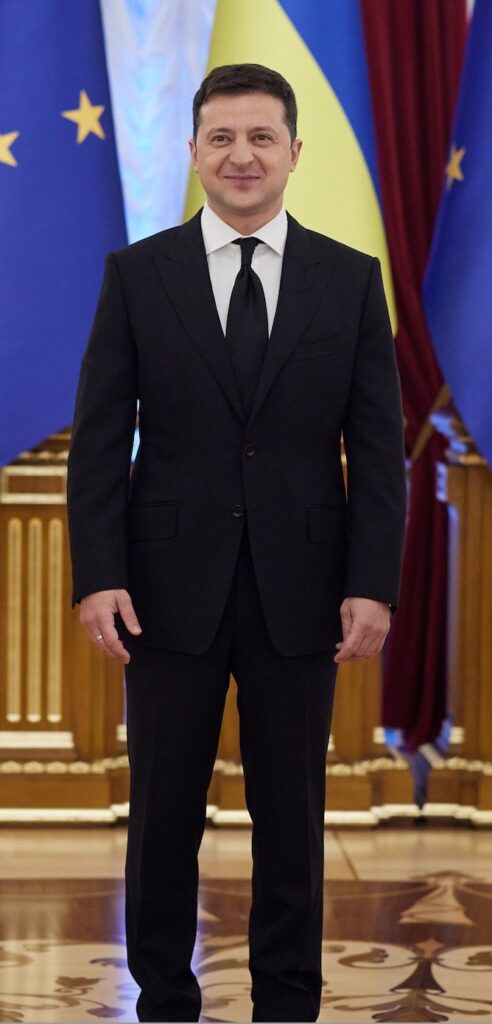By: Ernest Gurulé
For weeks Russian President Vladimir Putin reassured the world the military buildup on the Ukrainian border was nothing more than an exercise, that the 100,000 Russian troops, tanks, squadrons of warplanes, missile launchers and live fire were sim- ply self-defense drills in the event Ukraine ever decided to invade Russia.
Then suddenly last week, following a rambling and bellicose speech that included references to both Naziism and genocide occurring inside Ukraine, Putin reversed course and began his war. His speech and his militarism puzzled and mystified both historians and political scientists who argue his incursion into Ukraine is part of grander plan. They’ve also labeled his pre-war speech equal parts fantasy and fiction.

It has been a week since Putin’s military forces dropped the pretext of ‘drills’ and began their invasion. Tanks have rolled into several Ukrainian cities, Russian troops have attacked both civilian and military sites and hundreds of deaths, Ukrainian military and innocent victims, continue to mount. So too do those of Russian soldiers.
Six thousand miles from the mayhem, Denver healthcare writer Markian Hawryluk can almost hear the explosions. His family’s roots go back centuries in the region and extended family still lives there. “It’s an attack on our identity,” said Hawryluk. “Basically, what Russia is saying is that Ukraine hasn’t the right to exist.”
But historically speaking, without Ukraine there might not be a Russia. Ukraine in one form, one name or another has existed for more than a thousand years. In the 10th and 11th centuries it was the largest and most powerful state in Europe. Russian culture actually began in Kyiv, Ukraine’s capitol.
Putin’s war on Ukraine constitutes the most aggres- sive military operation in Europe since World War II. For Hawryluk’s family it is also a sad and nightmarish reminder of Europe’s darkest days. “My grandparents and parents fled in WWII,” he said. As Hitler was collecting nations in his march across the continent, Hawryluk’s family, along with countless others, fled leaving their homes seeking refuge wherever it could be found. For his family, the flight ended in Canada. But to Hawryluk and his family, Ukraine is never far away.
He has visited the country numerous times and remains close with family still there. Of course, his latest chats have been darkened by the shadow of war. “They’re showing incredible bravery and saying, ‘we’re not giving up, we’ll stand and fight.’” But they’re also worried about their children. “There’s no safe place to go. People are struggling with what to do next.”
The healthcare writer also laments what Putin’s army may do to scar the country and its centuries-old architec- ture, especially in Kyiv. “You see churches built in the 11th and 12th centuries…they’re things that can’t be replaced.”
While Putin has promised his incursion will be mini- mal and antiseptic, cameras are already recording carnage and images of subway tunnels teeming with people seek- ing safety. It’s also captured graphic imprints of war’s real cost, victims—lifeless bodies of young, old, men, women and the rubble of buildings that only days ago many called home. But video is also showing a resistance and resolve of Ukrainian men and women determined to fight for their country no matter the cost.
The world has also registered its unmistakable disdain for Putin’s actions. President Biden has united an array of countries, from Europe to Asia to Australia and New Zealand in imposing sanctions that have made it difficult for Russia’s government and businesses to conduct business. “The ruble cratered, the stock market froze and the public rushed to withdraw cash on Monday as Western sanctions kicked in and Russia awoke to uncertainty and fear over the rapidly spreading repercussions of President Vladimir V. Putin’s invasion of Ukraine,” The New York Times reported.” Other nations have barred Russian airlines from their air space; Germany suspended the Nord Stream Pipeline bringing Russian natural gas to Germany and also prepared shipment of a thousand anti-tank weapons and 500 Stinger missiles to Ukraine.
World leaders say the initial economic squeeze from the sanctions are far from over. Without the capital to wage his war, replenishing war materials, including basics like fuel for tanks and other vehicles and food for his troops, Putin will have to use every bit of imagination to continue his crusade.
While most world leaders have condemned Putin, America’s former president has gone in another direc- tion, praising him as ‘savvy’ and ‘a genius,’ and blaming President Biden for Putin’s war. Trump’s puffery is reminiscent of similar praise once ladled on other despotic leaders, including Saddam Hussein and North Korea’s Kim Jong Un. Trump’s fascination with dictators was summed up by one conservative columnist who wrote tersely, “Trump’s brain isn’t normal.”
The same point is being made about Putin by intel- ligence experts and scholars. “Historically,” said Denver’s Dr. Sheila Rucki, “he’s been an irrational actor.” The Metro State University Russian expert called the invasion “half-cocked” and “not much of a plan.” She, like others, also wonders about Putin’s state of mind, especially following his rambling preinvasion speech. “There were reports that his behavior had changed,” she said. Photos of a recent meeting between Putin and French President Macron in which each was oddly seated at opposite ends of fifty-foot table to discuss Ukraine also struck watchers as odd.
Rucki (pronounced Rooski) said while Putin has tar- geted Ukraine, its neighbors have taken notice fearing his ultimate goal may mean returning the old Soviet Union to its former sphere. NATO has also recently invoked its mutual defense statute, she said. “It’s something it’s never done before and suggests people are nervous about the end game.” It’s also elevated anxiety based on Putin’s unpredictability and Russia’s immense nuclear arsenal. Not coinci- dentally, Putin recently put Russia’s nuclear forces on alert.
More immediately, Rucki wonders and worries how far Putin will prosecute his war. “It reminds me of Sarajevo when Yugoslavia broke up. It was decimated in the civil war.”


